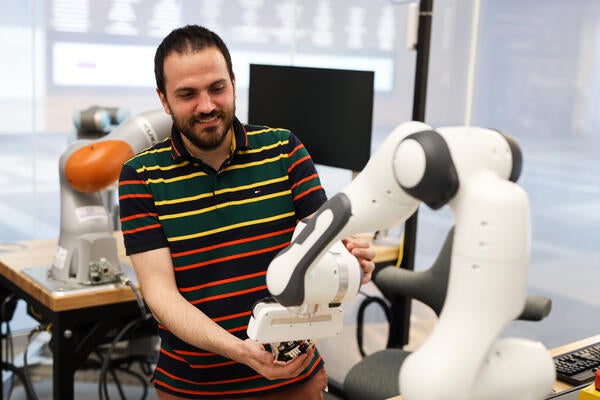
Completing the arc
Varma family donates $1 million for professorship six decades after Waterloo gamble paid off

Varma family donates $1 million for professorship six decades after Waterloo gamble paid off
By Brian Caldwell Faculty of EngineeringSix decades after travelling halfway around the world to take a chance on a new university in Canada, a proud alumnus is helping it grow in a way he would never have imagined possible.
Nityanand Varma was the proverbial immigrant with eight dollars in his pocket when he left his native India in the early 1960s to do a master’s degree in civil engineering at the University of Waterloo.
Now, as patriarch of a family that has maintained strong ties to Waterloo Engineering ever since, he is instrumental in a $1-million contribution to fund a new professorship in robotics.

Gennaro Notomista holds the new Varma Family Professorship in Robotics at Waterloo Engineering.
“It’s an arc, a journey, that I think is important to share,” said Varma’s son Amar, a serial entrepreneur who also earned an engineering degree at Waterloo. “This is representative of my parents’ life’s work and also of a generation that came to this country with an insatiable appetite to make life better for themselves.”
The donation helped create the Varma Family Professorship in Robotics, which is held by Gennaro Notomista, a young researcher from Napoli, Italy who comes to the post after graduate studies in Germany and the United States, and a year as a postdoctoral researcher in France.
Notomista, a professor of electrical and computer engineering, was part of a team at the Georgia Institute of Technology that developed an autonomous device called the SlothBot, a slow-moving, solar-powered robot that takes environmental readings while moving through forest treetops on a wire.

Nityanand Varma (left) receives a Waterloo Engineering award for community service from former dean Adel Sedra in 2011.
He plans to advance that work at Waterloo, where he was attracted in part by the state-of-the-art RoboHub and its function as umbrella facility for robotics researchers, to help understand and address urgent issues posed by climate change.
“Autonomy allows robots to explore environments which are hostile to humans, so they can be very useful for all of us,” Notomista said. “My goal is to enable robots to survive in these unknown, unpredictable environments.
“I think we are very, very late in trying to solve the serious environmental problems we face. We need to focus our efforts and we need to act now to protect and improve the health of our planet.”
In the near term, Notomista is building small SlothBots – likely about 50 centimetres long – for deployment to monitor environment conditions in Canada, the U.S. and Europe.
He is also optimistic about the potential of long-duration autonomous robots to make a difference in fields as diverse as agriculture, traffic monitoring and space exploration.
“The idea is for the robots to be resilient to environmental conditions, as well as unexpected failures of the robots themselves, by leveraging their structures as well as their control algorithms,” Notomista said.
The untapped potential of robots to improve human lives was at the heart of the donation by the Varma family. So, too, was a desire to give other students the educations and opportunities Nityanand and Amar benefited from.
Nityanand actually earned two graduate degrees from Waterloo, one in civil engineering in 1964, and another in management sciences and systems engineering in 1970, before enjoying a long career as an engineer at Bell Canada, as well as working as an entrepreneur.
Raising a family with his wife, Shashi, in the Ottawa area, he also made a name for himself through volunteer work and was honoured by Waterloo Engineering in 2011 with the Alumni Achievement Medal for Community Service.
Amar, who has two older sisters, earned an electrical and computer engineering degree from Waterloo in 1999 and is continuing his life’s work as an entrepreneur and community builder.
He sees the new professorship as a testament to the hard work and determination of his parents, and is hopeful it will have a lasting impact on both future students and the field of robotics.
“To the extent that robotics can make human life better, we want to support that as a family,” Amar said. “We feel like this will help.”
Main photo: Members of the Varma family, including Nityanand (second from left), Shashi (second from right) and Amar (right) pose for a group shot.

Read more
Waterloo co-op student applies engineering and tech skills at Caivan to support purpose-built housing and build land-development expertise

Read more
How Doug Kavanagh’s software engineering degree laid the foundation for a thriving career in patient care

Read more
Upside Robotics secures new funding to accelerate the future of sustainable farming
The University of Waterloo acknowledges that much of our work takes place on the traditional territory of the Neutral, Anishinaabeg, and Haudenosaunee peoples. Our main campus is situated on the Haldimand Tract, the land granted to the Six Nations that includes six miles on each side of the Grand River. Our active work toward reconciliation takes place across our campuses through research, learning, teaching, and community building, and is co-ordinated within the Office of Indigenous Relations.